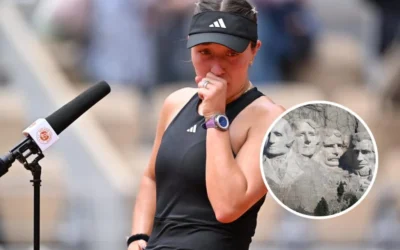The Olympic Dream: Is Flag Football a Feasible Goal for NFL Stars?
The upcoming 2024 Summer Olympics in Paris are set to introduce flag football as a competitive sport, representing a significant change in the way the game is perceived on a global level. While the NFL has long embraced the popularity of football, the historic inclusion of flag football in the Olympics raises eyebrows and ignites debates about what happens when professional athletes, who have built their careers on contact sports, shift their focus to a non-contact variant.
Patrick Mahomes: A Reluctant Contender
Patrick Mahomes, the star quarterback of the Kansas City Chiefs and reigning NFL MVP, has expressed reservations about participating in the Olympic pursuit for flag football gold. “I’ll probably leave Olympic flag football to the younger guys,” he remarked during a recent press event. This statement has resonated with many fans and spectators, considering Mahomes’ status as one of the most talented quarterbacks in NFL history.
Despite his on-field brilliance and accolades, Mahomes has shown humility in recognizing the ambitions and capabilities of younger athletes who may be eager to showcase their skills on an international stage. His reflections remind us of the pressures and responsibilities that elite athletes face and the impact they can have on the upcoming generation.
Sean McVay Backs the Olympic Vision
Contrasting Mahomes’ more reserved approach, Los Angeles Rams head coach Sean McVay has been an ardent supporter of NFL players pursuing Olympic glory in flag football. McVay’s enthusiasm stems from the belief that participating in the Olympics could elevate the sport’s visibility and enhance its appreciation at a grassroots level. He remarked, “It’s an amazing opportunity for our players to showcase their talents outside the traditional frame of the NFL. I believe it can open new doors for flag football and its growth.”
With high-profile advocates like McVay in the corner of Olympic flag football, there could be an influx of interest among NFL players eager to take part in an event that can add another feather to their cap. Imagine the Super Bowl MVPs and Pro Bowl selections teaming up to serve their country in a new capacity. The temptation to represent their nation could drive some players toward a competition that includes athletes outside of their typical opponents.
The Potential for an NFL Dream Team
One of the most exciting prospects involves creating an ‘NFL Dream Team’ for flag football. This hypothetical squad might consist of a mixture of breakout stars and seasoned veterans, creating a blend of skill, experience, and teamwork. But as exciting as it sounds, building a ‘Dream Team’ comes with its potential pitfalls and logistics.
A mixed roster featuring elite talent from the NFL might be appealing, but harmonizing this talent could be a challenge. The differences in play style between the NFL and flag football are substantial; the NFL emphasizes power and contact, while flag football prioritizes speed and tactics. Top-tier athletes accustomed to tackling may find themselves needing to adjust their mental frameworks significantly, not to mention dealing with the emotional and psychological challenges of competing in a sport they’ve trained to avoid—when it’s time to hit.
From Glory to Potential Disaster
While the concept of an NFL Dream Team for flag football at the Olympics is alluring, it’s equally fraught with challenges and potential disasters. As discussed, adjusting to a non-contact format requires not only a change in tackling techniques, but also mental adjustments regarding sportsmanship and collegiality.
Additionally, the stakes are different in the Olympic arena compared to the NFL playoffs. The Olympic Games symbolize national pride, and with that comes immense pressure. The weight of representation might push some players to perform in ways that do not align with their strengths in flag football, leading to unforeseen pitfalls.
Moreover, imagine the fallout if the team, laden with high-visibility stars, fails to mediate success. The criticism will be rampant, drawing attention to the gulf between different football formats. Super Bowl champions showcasing less-than-stellar performance could do more damage than good—not only to individual players’ reputations but also to flag football’s credibility on the world stage.
Nurturing Flag Football’s Future
Despite the potential disasters, the addition of flag football to the Olympic roster could also serve a greater purpose: the promotion and evolution of the sport itself. As more NFL players participate in flag football competitions, they might inspire the younger generation to take up the game. Young athletes could see football as a viable avenue not just for professional achievement, but also as a means of representing their countries on the grandest stages.
The success of flag football in the Olympics could provoke a big shift in how the game is played at various levels, leading to more grassroots initiatives to introduce flag football into schools and communities. Encouraging youth to participate fosters the values of teamwork, sportsmanship, and inclusivity as flag football is more accessible than its tackle counterpart.
The Role of the NFL and its Stars
As this new trend unfolds, the role of established NFL stars remains significant in shaping the landscape of Olympic flag football. They serve as the face of the sport, encouraging broad engagement from viewers and potential players alike. Their endorsement can draw attention to the growing accessibility of flag football, building a larger community enthusiastic about the sport.
However, NFL stars must navigate their unique personas and recognition carefully. Their participation might increase anxiety and pressure, making it difficult for them to adapt to a new sport even while generating excitement around it. Compromising the integrity and enjoyment of competing in the Olympics could put a damper on the positive aspects this initiative might bring.
Conclusion: Dream Team or Nightmarish Scenario?
In summary, the decision for NFL players to pursue Olympic gold in flag football rests on a razor’s edge, balancing desire and competitive spirit against potential pitfalls. While creating a Dream Team might seem enticing, the unique challenges that arise from the different nature of the game can complicate its success. Players like Patrick Mahomes remind us worth in recognizing talents and vulnerabilities, while supporters like Sean McVay keep hopes alive that greater exposure for flag football could engender its future growth.
The Olympic inclusion of flag football represents the marriage of traditional and modern sports cultures, challenging athletes and fans to re-examine their understanding of the game. Only time will tell whether this Olympic adventure will lead to elevated triumphs or unforeseen disasters. As the passion for sports continues to evolve, so too will the narratives surrounding those who play them.






